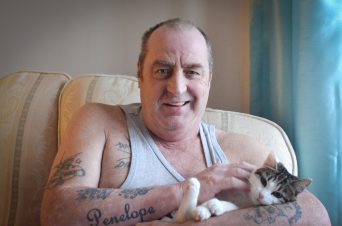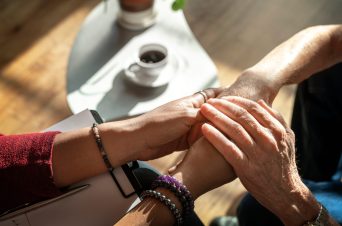Supporting people to lead happy, healthy working lives
Integrated employment support
With LEARNING AND WORK INSTITUTE AND WORK AND HEALTH UNIT, UK
Meaningful work makes a key contribution to a healthy, happy life, but many people are prevented from working because of unmet health needs.
We’ve worked with the Work and Health Unit and the Learning and Work Institute to create the Integrated Employment Support Programme, which helps local areas support people that are unemployed due to health conditions back into meaningful work.
The problem
1 in 2
Almost half of people receiving Employment and Support Allowance are claiming primarily because of mental health problems.
1 million
The number of people with disabilities and other health problems the government has targeted to support into work by 2020.
The issues that lead to long-term unemployment and ill health are complex and systemic. There are many interventions, both here in the UK and abroad, that aim to support people that are unemployed back into work. There are also interventions that explicitly focus on supporting people who have long-term health conditions. As yet, these have not delivered transformation at scale: they may be successful in their local area, but have not reached the large number of people with health conditions who are unemployed into meaningful, sustainable work. Given the size and systemic nature of the challenge, it’s unrealistic to expect a stand-alone service, however good, to achieve this change on its own.
“It is easy to feel worthless.” Workshop participant
In thinking about how to tackle this challenge, the Work and Health Unit (co-sponsored by the Department of Health and Department of Work and Pensions) and the Learning and Work Institute recognised the need to mobilise and release the resources, capabilities and positive behaviours of key actors across all sectors in local areas – including the strengths and talents of those that are currently out of work.
The aim of the Integrated Employment Support Programme is to provide local areas with a model that brings together their existing services, from employment, housing, disability services, and health, and creates a step change in the way that people with health conditions are supported into work. The model focuses on the individual and is highly personal, but it is also about making change happen at scale.
Our impact
12 rapid co-design workshops
to develop a new approach to support.
Over 50 people
who are currently unemployed sharing their experiences, and co-designing a new approach to support.
35 experienced professionals
from across sectors challenging and developing the model.
7 stages
in the new support model: Aware, Join, Build, Develop, Search, Maintain, Thrive.
GENERATING NEW INSIGHTS
We spent time in Sheffield, Portsmouth and Cornwall hearing from people who are currently unemployed. We wanted to understand their lives – their ambitions, what excites and motivates them, their greatest struggles, and their experience of existing employment services. From their stories we built a rich and detailed understanding of what these people were looking for when it came to work – including the differences we would need to accommodate within this diverse group for a model to work at scale.
“I would like a service that is always there for you and always believes in you, so you can believe in yourself” Workshop participant
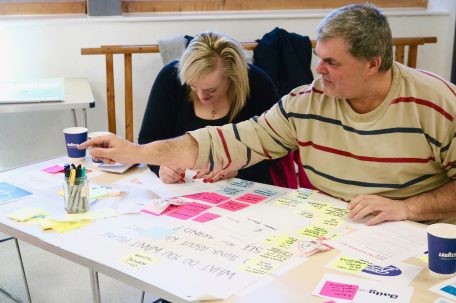
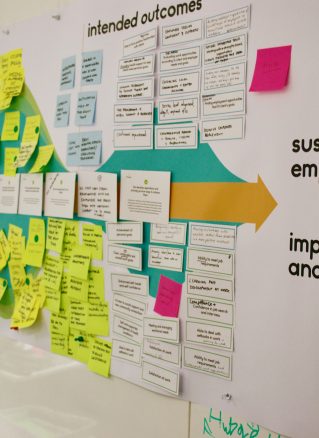
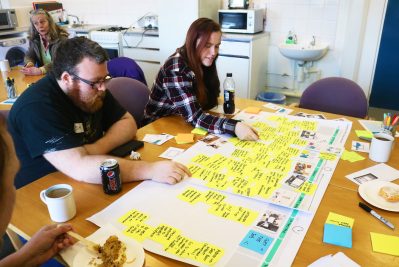
DESIGNING A NEW MODEL OF SUPPORT
Using these rich insights, we co-designed a new model of employment support with our partners that had two key roles at its heart: a mentor and a coach. These two roles were included to bring new expertise to the support on offer, with the mentor being highly skilled in relational, emotional support and wellbeing, and the coach as an expert at co-defining work goals, pursuing opportunities and preparing for work. The way in which the mentor and coach work with clients is critical, with a shift away from the existing deficit based view of unemployment (focusing on what people can’t do), to an approach which recognises the talents and aspirations of every individual and supports them to pursue these.
“I have loads of stuff I can do that I could share with others, changing nappies, decorating, doing things in the garden... we could do something for the environment! I would really enjoy that” Workshop participant
“Staff would be persistent, people that I could always rely on. They would care about me and know me well enough to match me up to things I wouldn’t have thought of” Workshop participant
Working with colleagues at the Learning and Work Institute and the Health and Work Unit, we created a handbook for local areas which presents the new model of support, the key relationships and group support that give it its structure, and the principles that underpin the approach. We are now awaiting further funding to take this model from the page to practice in initial pilot sites.
“Providing clarity, structured thinking, and deep intelligence to help overcome some of the challenges faced by the most disadvantaged and marginalised people, the Innovation Unit have provided a refreshing approach and comprehensive solution that is resolutely (and unapologetically) centred around service users’ own motivations, and lived experience. The Unit have delivered a rigorous service solution combined with a human touch often lacking in the design of public services” Ash Patel
“Complex problems such as this can only be solved by those at the sharp end co-designing a fresh approach. Innovation Unit have helped to make that process of co-design truly productive.” Matthew Pike
Project team
Ella Walding
Head of Service Design
Aviv Katz
Senior Associate
